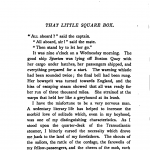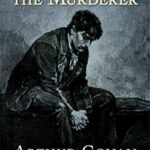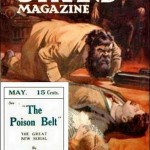“You know very well that I would, Mister Ezra. When you want anything done you remember it, but if you have no use for me, then there is never a kind look on your face or a kind word from your lips. If I was a dog you could not use me worse. I could stand your harshness. I could stand the blow you gave me, and forgive you for it, from my heart; but, oh! it cut me to the very soul to be standing by and waiting while you were making up to another woman. It was more than I can bear.”
“Never mind, my girl,” said Ezra in a soothing voice; “that’s all over and done with. See what I’ve brought you.” He rummaged in his pocket and produced a little parcel of tissue paper, which he handed to her.
It was only a small silver anchor, with Scotch pebbles inlaid in it. The woman’s eyes, however, flashed as she looked at it, and she raised it to her lips and kissed it passionately.
“God bless it and you too!” she said. “I’ve heard tell as the anchor’s the emblem of hope, and so it shall be with me. Oh, Ezra, you may travel far and meet them as can play and can sing and do many a thing as I can’t do, but you’ll never get one who will love you as dearly and well.”
“I know it, my lass, I know it,” said Ezra, smoothing down her dark hair, for she had dropped upon her knees beside the couch. “I’ve never met your equal yet. That’s why I want you down at Bedsworth. I must have some one there that I can trust.
“What am I to do down at Bedsworth?” she asked.
“I want you to be Miss Harston’s companion. She’ll be lonely, and will need some other woman in the house to look after her.”
“Curse her!” cried Rebecca, springing to her feet with flashing eyes. “You are still thinking of her, then! She must have this; she must have that! Everything else is as dirt before her. I’ll not serve her-so there! You can knock me down if you like.”
“Rebecca,” said Ezra slowly, “do you hate Kate Harston?”
“From the bottom of my soul,” she answered.
“Well, if you hate her, I tell you that I hate her a thousand times more. You thought that I was fond of her. All that is over now, and you may set your mind at ease.”
“Why do you want her so well cared for, then?” asked the girl suspiciously.
“I want some one who feels towards her as I do to be by her side. If she were never to come back from Bedsworth it would be nothing to me.”
“What makes you look at me so strangely?” she said, shrinking away from his intense gaze.
“Never mind. You go. You will understand many things in time which seem strange to you now. At present if you will do what I ask you will oblige me greatly. Will you go?”
“Yes, I will go.”
“There’s a good lass. Give us a kiss, my girl. You have the right spirit in you. I’ll let you know when the train goes to-morrow, and I will write to my father to expect you. Now, off with you, or you’ll have them gossiping downstairs. Good night.”
“Good night, Mister Ezra,” said the girl, with her hand upon the handle of the library door. “You’ve made my heart glad this night. I live in hope-ever in hope.”
“I wonder what the deuce she hopes about,” the young merchant said to himself as she closed the door behind her. “Hopes I’ll marry her, I suppose. She must be of a very sanguine disposition. A girl like that might be invaluable down at Bedsworth. If we had no other need for her, she would be an excellent spy.” He lay for some little time on the couch with bent brow and pursed lips, musing over the possibilities of the future.
While this dialogue had been going on in the library of Eccleston Square, Tom Dimsdale was still wending his way homewards with a feeling of weight in his mind and a presentiment of misfortune which overshadowed his whole soul. In vain he assured himself that this disappearance of Kate’s was but temporary, and that the rumour of an engagement between her and Ezra was too ridiculous to be believed for a moment. Argue it as he would, the same dread, horrible feeling of impending trouble weighed upon him. Impossible as it was to imagine that Kate was false to him, it was strange that on the very day that this rumour reached his ears she should disappear from London. How bitterly he regretted now that he had allowed himself to be persuaded by John Girdlestone into ceasing to communicate with her. He began to realize that he had been duped, and that all these specious promises as to a future consent to their union had been so many baits to amuse him while the valuable present was slipping away. What could he do now to repair the past? His only course was to wait for the morrow and see whether the senior partner would appear at the offices. If he did so, the young man was determined that he should have an understanding with him.
So downcast was Tom that, on arriving at Phillimore Gardens, he would have slipped off to his room at once had he not met his burly father upon the stairs. “Bed!” roared the old man upon hearing his son’s proposition. “Nothing of the sort, sir. Come down into the parlour and smoke a pipe with me. Your mother has been waiting for you all the evening.”
“I am sorry to be late, mother,” the lad said, kissing the old lady. “I have been down at the docks all day and have been busy and worried.”
Mrs. Dimsdale was sitting in her chair beside the fire, knitting, when her son came in. At the sound of his voice she glanced anxiously up at his face, with all her motherly instincts on the alert.





